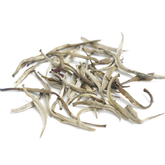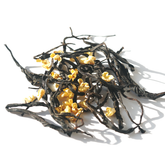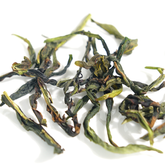Does White Tea Have Caffeine? A Science-Backed Guide for Health-Conscious Drinkers
According to a study in the Journal of Food Science: 72% of Americans mistakenly believe white tea is "caffeine-free." Many confuse "white tea" with herbal teas like chamomile or mint, but they’re fundamentally different. White tea comes from the Camellia sinensis plant (the tea plant) and contains caffeine. Herbal teas, however, are made from other plants (flowers, roots, spices) and are naturally caffeine-free—unless blended with real tea leaves.
-
White tea, like green tea and black tea, comes from the leaves of the Camellia sinensis plant. Caffeine is a natural defense compound of the tea plant and exists in every leaf, so white tea can never be truly "caffeine-free."
| Category | White Tea | Herbal Tea |
| Source | Made from the tea plant(Camellia sinensis) | Made from flowers, herbs, spices (e.g., chamomile, mint, ginger) |
| Contains Caffeine? | Yes (6-60mg/cup) | No (naturally caffeine-free, unless mixed with true tea) |
| Popular Types | Silver Needle, Shou Mei, White Peony,Yuegaungbai | Chamomile, Peppermint, Hibiscus, Ginger |
| Flavor Profile | Light, floral, slightly sweet | Varies widely (e.g., chamomile=mild, mint=refreshing) |
| Health Benefits | High antioxidants, gentle energy boost | Targeted benefits (e.g., digestion, relaxation, sleep) |
Additionally, many believe that white tea has lower caffeine content due to its simple processing methods. However, processing has minimal impact on caffeine levels. In fact, according to 2023 data from the U.S. Department of Agriculture (USDA), caffeine in an 8-ounce cup of white tea ranges widely—from 6 mg to 75 mg—equivalent to one-third to 1.5 times the caffeine content of black tea.
Why Does White Tea Have Such a Wide Range of Caffeine Content?
The core reason for this variation lies in the biological traits of tea buds. White tea is crafted from silvery-white buds picked in early spring. These immature buds naturally produce 3 times higher caffeine concentrations than mature leaves—a natural defense mechanism against pests. For instance, Fujian's Baihao Yinzhen (with over 90% buds) contains 60-75 mg/cup, surpassing some black teas, while Shou Mei (blended with older leaves) has significantly lower caffeine (~15 mg/cup). For tea lovers seeking lower caffeine:
For tea lovers seeking lower caffeine:
- Opt for varieties with fewer buds, such as Gong Mei or Shou Mei.
- Avoid broken-leaf tea bags, as fragmented leaves release more caffeine during steeping.
How to Reduce Caffeine Intake from White Tea?
While white tea contains caffeine, it is gentler than many other teas (e.g., less likely to trigger stomach acid compared to black tea) and has a subtle aroma, making it ideal for those who prefer a lighter taste, especially women. If you’re concerned about caffeine, you can adjust brewing methods. The suggestions below are based on extensive testing feedback from Chinese tea enthusiasts, which can reduce caffeine intake by 30-50%:
Core Control Points
Water Temperature → Prioritize Low Heat
Why it works: Caffeine dissolves much faster in hot water (cold water releases only 30% vs. 90%+ in hot water).
Recommendations: Use cold water (39-77°F) or room-temperature water for cold brewing (6-12 hours). Steeping Time → Keep It Short
Steeping Time → Keep It Short
Why it works: Caffeine spikes in the first 3 minutes (cutting time slashes caffeine by 50%+).
Recommendations: For hot tea, steep ≤90 seconds and remove leaves immediately.
Tea Amount → Less Leaves, More Water
Why it works: Fewer leaves = less caffeine (1-2g less per cup = 5-10mg caffeine saved).
Recommendations: Use 1-2g tea per 150ml water (vs. standard 3-5g), or opt for pre-portioned tea bags.
| Variables | Recommendations | Caffeine Reduction | Notes |
| Water Tem |
▶ Cold brew (39-77°F) ▶ Avoid boiling water (<176°F) |
▼ 60-70% less | Store cold brew in the fridge to stay fresh |
| Steeping Time |
▶ Hot brew: ≤90 seconds ▶ Cold brew: ≤6 hours |
▼ 40-50% less | Add herbs/fruit if flavor feels weak |
| Tea Quantity |
▶ Halve your usual amount (1-2g/150ml) ▶ Use tea bags |
▼ 50-70% less | Weak flavor? Extend cold brew time! |
| Combo Hack | ▶ Cold water + short time + minimal leaves | ▼ Up to 85% less | Best for caffeine-sensitive folks (plan ahead!) |
Extra Hacks
Skip the First Brew.Pour out the initial hot rinse (5-second quick wash) – cuts 15-20% of surface caffeine.
Pick Low-Caffeine Tea.Go for Shou Mei (mature leaf tea) or white teas with more stems – naturally lighter in caffeine.
Mix It Up.Blend white tea with caffeine-free herbal teas like chamomile or rooibos – mellows flavor and caffeine kick.
Common Questions
How much caffeine in white tea?
White tea has 15-30mg caffeine per cup (way less than coffee), depending on brewing style.
What does white tea taste like?
Light, floral, and slightly sweet—think fresh grass, honey, or subtle peach notes.
How to brew white tea?
Steep with water below boiling (160-175°F) for 1-3 minutes; cold brew overnight for smoother flavor.
Where to buy white tea?
Specialty tea shops, Amazon, health stores like Whole Foods, or Asian grocery stores (look for Fujian origin).
How is white tea made?
Young leaves and buds are gently wilted and dried in sunlight—no heavy processing or oxidation.
SEE MORE
If you have questions about selecting tea:
Learn-more-about-chinese-tea
If you have questions about the benefits of tea:
Health-benefits-of-chinese-tea
If you have questions about brewing tea:
How-to-brew-loose-leaf-tea






